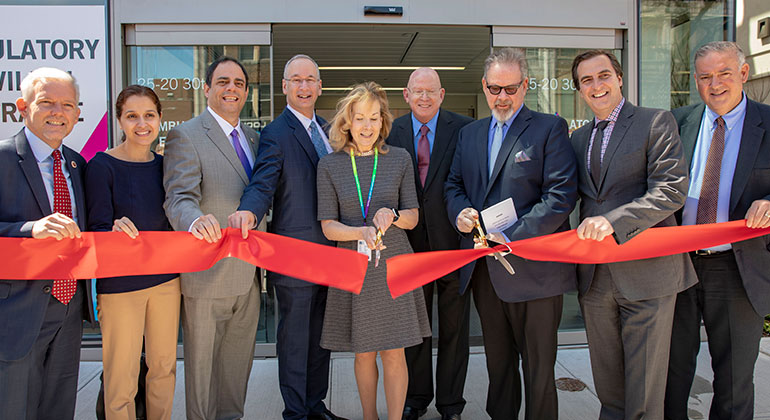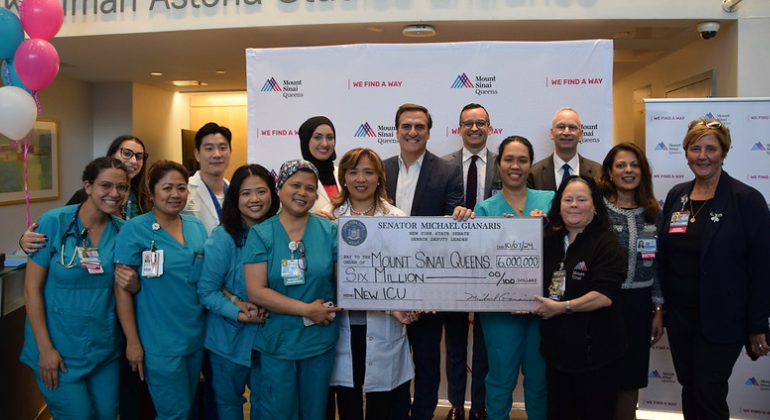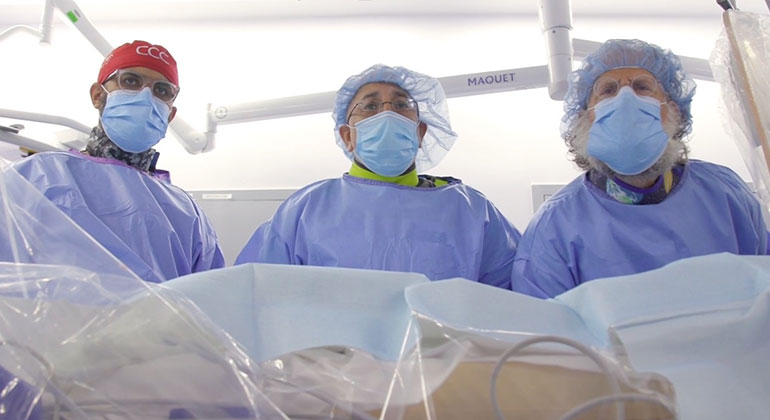The Mount Sinai Health System Is Formed to Provide Expanded Access to Primary, Specialty, and Ambulatory Care
Seven member hospital campuses and a single medical school serve as basis for integrated health care system.
The Boards of Trustees of The Mount Sinai Medical Center and Continuum Health Partners (CHP) today announced completion of the transaction to establish a new, integrated health system called the Mount Sinai Health System. Encompassing the Icahn School of Medicine at Mount Sinai and seven member hospital campuses, the Health System will provide increased access to primary and specialty care for local and global communities, as well as an expansive network of ambulatory care centers throughout the New York metropolitan region.
Kenneth L. Davis, MD, President and CEO of the Mount Sinai Health System, said, "The new, integrated health care system-the Mount Sinai Health System-will improve quality outcomes, increase efficiencies, and create economies of scale by expanding access to primary and specialty care across a citywide network. We will be able to take care of patients throughout their lifespans and at all levels of care. Indeed, if you live in Manhattan, there will almost always be a Health System doctor within walking distance of your residence, as well as a substantial presence of our physicians and facilities in Queens, Brooklyn, Staten Island and Long Island." Dr. Davis has been President and CEO of The Mount Sinai Medical Center since 2003.
Peter W. May, Chairman of the Board of Trustees of the new Mount Sinai Health System, explained, "After spending many months planning for the creation of this new health system, I am confident that our leaders will use synergies between the two entities to create an exceptional health care system that will serve our extensive array of communities. We all look forward to working closely with our new partners." Mr. May has been Chairman of the Boards of Trustees of The Mount Sinai Medical Center since 2002. He joined the Mount Sinai Boards of Trustees in 1989.
Steven Hochberg, Senior Vice Chairman of the Board of Trustees of Mount Sinai Health System, said, "Health care providers must face today's numerous challenges in creative and innovative ways, as well as with bold determination, to anticipate and respond to the ever-evolving health care landscape. The Mount Sinai Health System does exactly that through a multidimensional, world-class delivery system that emphasizes excellence in clinical care, research, and medical education." Mr. Hochberg continued, "It reaffirms Mount Sinai's recognized place as a global leader in regional, national, and international health care arenas, which is additionally strengthened through the clinical programs and long histories of service of the Continuum hospitals. Most importantly, it allows us to fulfill our mission to meet the needs of everyone who turns to us for help." Mr. Hochberg has served as Chairman of the Board of Trustees for Continuum Health Partners since 2011 and joined the CHP Board in 2005.
The Mount Sinai Health System includes the following seven member hospital campuses:
- Beth Israel Medical Center: An 856-bed teaching hospital founded in 1889 on Manhattan's Lower East Side, Beth Israel Medical Center is notable for its unique approach to combining medical excellence with clinical innovation. The hospital has recruited world-class specialists to expand services in heart disease, cancer, neurology, and orthopedics. It also continues its long tradition of excellence in medical specialties including gastrointestinal disease, chemical dependency, psychiatric disorders, pain management and palliative care, and HIV/AIDS research and treatment. The hospital campus also has significantly advanced its commitment to delivering community-based ambulatory care and expanding patient access to primary and specialty care.
- Beth Israel Brooklyn: A 212-bed community hospital located in Midwood, Beth Israel Brooklyn has undergone numerous renovations and upgrades over the past decade to help expand its scope of services. The latest advances include a completely redesigned intensive care unit, new digital mammography equipment, and a state-of-the-art radiology suite. The hospital's Emergency Department also serves as a critical community resource, and it enjoys an excellent reputation in such specialties as cardiac care, general surgery, gynecology, orthopedics, and geriatrics.
- The Mount Sinai Hospital: A 1,171-bed tertiary- and quaternary-care teaching facility founded in 1852, The Mount Sinai Hospital is located on the border between East Harlem and the Upper East Side and serves one of the most diverse patient populations in the world. The hospital consistently earns Magnet status for nursing care, and it is the only medical center in New York State to have earned Disease-Specific Care Comprehensive Stroke Center Certification from The Joint Commission. In the 2013-14 "Best Hospitals" issue of U.S. News & World Report, the institution ranked as one of the top 25 hospitals in 7 specialties nationally. Its Kravis Children's Hospital at Mount Sinai was named in U.S. News & World Report's 2013-14 "Best Children's Hospitals" issue, with top rankings in 7 out of 10 pediatric specialties.
- Mount Sinai Queens: As a 235-bed licensed acute care facility in Astoria, Mount Sinai Queens provides adult medical and surgical services, with a team of nearly 500 physicians representing about 40 medical and surgical specialties and subspecialties. Recognized as a leader in stroke care, Mount Sinai Queens is designated by the New York State Department of Health and The Joint Commission as a primary stroke center. Between the physicians and staff, 35 languages are spoken at Mount Sinai Queens, illustrating one of the many ways in which the hospital serves its culturally diverse community.
- New York Eye and Ear Infirmary: With 69 certified beds, New York Eye and Ear Infirmary is one of the world's leading facilities for the diagnosis and treatment of all diseases of the eyes, ears, nose, and throat, as well as related conditions. Founded in 1820 as the nation's first specialty hospital, it performs more than 30,000 surgical cases and receives 225,000 outpatient visits a year. The New York Eye and Ear Infirmary is regularly ranked as one of the best hospitals in America, according to U.S. News & World Report, and was awarded Magnet status for excellence in nursing care.
- Roosevelt Hospital: With 505 beds, Roosevelt Hospital is a full-service community and tertiary-care hospital, with an Emergency Department serving Midtown and the west side of Manhattan. Since its founding in 1871, the campus - as part of St. Luke's-Roosevelt Hospital Center -- has placed strong emphasis on primary and specialty care. Roosevelt serves as the home to several renowned clinical services, including those in endovascular surgery, cancer, cardiology, and obstetrics and gynecology. Roosevelt also maintains a strong primary care presence in its surrounding neighborhoods through ambulatory and physician practices and through longstanding partnerships with some of New York's largest federally qualified health centers, particularly the William F. Ryan Community Health Center.
- St. Luke's Hospital: With 523 beds, St. Luke's Hospital serves as the principal health care provider for the West Harlem and Morningside Heights communities and operates one of Manhattan's few Level 1 trauma services. Founded in 1847, it is home to the Al-Sabah Arrhythmia Institute, a world-class, multidisciplinary center specializing in the care and treatment of heart ailments. St. Luke's -- as part of St. Luke's-Roosevelt Hospital Center -- also enjoys an outstanding reputation for services in many other medical specialties, including internal medicine, geriatrics, trauma, bariatric surgery, vascular disease, HIV/AIDS, cardiac care, physical rehabilitation, psychiatric disorders, and substance abuse. St. Luke's also continues to expand its commitment to delivering community-based ambulatory care and expanding access to primary and specialty care.
Through the Icahn School of Medicine at Mount Sinai, the Mount Sinai Health System will benefit from synergies with a preeminent academic medical center. As one of the nation's leading medical schools, the Icahn School of Medicine is on the forefront of medical and scientific training, biomedical research, and patient care. It will serve to integrate clinical and research missions across the System. Over time, all Continuum affiliations with other medical schools will be transferred to the Icahn School of Medicine at Mount Sinai, which will be the single medical school for the Health System.
"In this rich and dynamic environment, Mount Sinai's medical and graduate students, as well as our residents, will be offered a wide range of clinical and research experiences," said Dennis Charney, MD, the Anne and Joel Ehrenkranz Dean, Icahn School of Medicine at Mount Sinai, and President of Academic Affairs for the Health System. "A larger clinical trial footprint will help us provide the most cutting-edge care for patients with a great range of medical conditions in the diverse communities we serve. We are confident that new clinical institutes of excellence will be the hubs of translational research and health care innovation across specialties."
Internationally recognized for excellence in research, patient care, and education, Mount Sinai and its member hospital campuses will forge ahead with a vision of comprehensive care for patients. Its sophisticated primary care network will include more than 430 full- and part-time physicians. It will also feature 12 free-standing minority-owned ambulatory surgery centers, 2,784 full- and part-time physicians, and 3,783 voluntary physicians. The System will also include a robust and continually expanding network of multi-specialty services, including over 45 ambulatory care practices throughout the five boroughs of New York City, Westchester, and Long Island.
Mount Sinai maintains more than 40 clinical and academic relationships with local health care organizations and its physicians serve patients in more than 200 community locations throughout the New York metropolitan area. The Health System's extensive ambulatory network is designed to prevent hospital readmissions and Emergency Department visits in order to lower costs and improve outcomes.
With a larger, more expansive system, Mount Sinai will be able to test new models of care, including aligning payment incentives to promote quality over quantity of services, through its Accountable Care Organization (ACO) called Mount Sinai Care, LLC. Launched in July 2012, Mount Sinai Care has more than 21,000 Medicare patients and serves as a new health care model, with a cadre of specially-trained care coaches facilitating a continuity of care. Mount Sinai Care is the first ACO at an academic medical center in Manhattan.
"With an increased number of primary care physicians, the Health System will help define and provide large-scale population management, so patients receive appropriate prevention, intervention, and treatment early on-before a disease progresses," said Dr. Davis.
The Mount Sinai Health System by the Numbers*
| Total beds certified by the New York State Department of Health | 3,571 |
| Operating rooms | 138 |
| Free-standing ambulatory surgical centers (minority owned) | 12 |
| Affiliated community health centers | 31 |
| Physicians (2,784 full- and part-time and 3,783 voluntary) | Approximately 6,600 |
| Residents and fellows | More than 2,000 |
| Employees | Approximately 35,000 |
| Inpatient admissions | More than 177,000 |
| Babies delivered a year | Approximately18,000 |
| Outpatient visits to offices and clinics (non-Emergency Department) | More than 2,600,000 |
| Emergency Department visits | More than 500,000 |
* Calendar year 2012.
Icahn School of Medicine at Mount Sinai*
| Year founded | 1968 |
| Medical students | 607 |
| Graduate students | 211 |
| MD/PhD students | 102 |
| Postdoctoral fellows | 510 |
| Grant funding | $322.9 million (including $190 million in NIH funding in 2012; an estimated $215 million in NIH funding is projected for 2013) |
| U.S. News & World Report ranking among medical schools | No 18 |
* As of 2012.
A new Mount Sinai Health System website will launch soon.
About the Mount Sinai Health System
Mount Sinai Health System is one of the largest academic medical systems in the New York metro area, with 48,000 employees working across seven hospitals, more than 400 outpatient practices, more than 600 research and clinical labs, a school of nursing, and a leading school of medicine and graduate education. Mount Sinai advances health for all people, everywhere, by taking on the most complex health care challenges of our time—discovering and applying new scientific learning and knowledge; developing safer, more effective treatments; educating the next generation of medical leaders and innovators; and supporting local communities by delivering high-quality care to all who need it.
Through the integration of its hospitals, labs, and schools, Mount Sinai offers comprehensive health care solutions from birth through geriatrics, leveraging innovative approaches such as artificial intelligence and informatics while keeping patients’ medical and emotional needs at the center of all treatment. The Health System includes approximately 9,000 primary and specialty care physicians and 10 free-standing joint-venture centers throughout the five boroughs of New York City, Westchester, Long Island, and Florida. Hospitals within the System are consistently ranked by Newsweek’s® “The World’s Best Smart Hospitals, Best in State Hospitals, World Best Hospitals and Best Specialty Hospitals” and by U.S. News & World Report's® “Best Hospitals” and “Best Children’s Hospitals.” The Mount Sinai Hospital is on the U.S. News & World Report® “Best Hospitals” Honor Roll for 2025-2026.
For more information, visit https://www.mountsinai.org or find Mount Sinai on Facebook, Instagram, LinkedIn, X, and YouTube.
Mount Sinai Health System Celebrates Prestigious Magnet® Recognition
Sep 24, 2019 View All Press Releases
Mount Sinai Queens Celebrates Grand Opening of Its New Pavilion
Apr 26, 2018 View All Press ReleasesMount Sinai Queens Opens New Outpatient Imaging Facility
Jul 05, 2016 View All Press ReleasesMount Sinai Queens Opens New Expanded Emergency Department
Jun 09, 2016 View All Press Releases
